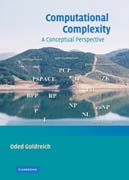
Complexity theory is a central field of the theoretical foundations of computer science. It is concerned with the general study of the intrinsic complexityof computational tasks; that is, it addresses the question of what can be achieved within limited time (and/or with other limited natural computational resources). This book offers a conceptual perspective on complexity theory. It isintended to serve as an introduction for advanced undergraduate and graduate students, either as a textbook or for self-study. The book will also be usefulto experts, since it provides expositions of the various sub-areas of complexity theory such as hardness amplification, pseudorandomness and probabilistic proof systems. In each case, the author starts by posing the intuitive questions that are addressed by the sub-area and then discusses the choices made in the actual formulation of these questions, the approaches that lead to the answers, and the ideas that are embedded in these answers. INDICE: 1. Introduction and preliminaries; 2. P, NP and NP-completeness; 3. Variations on P and NP; 4. More resources, more power?; 5. Space complexity;6. Randomness and counting; 7. The bright side of hardness; 8. Pseudorandom generators; 9. Probabiistic proof systems; 10. Relaxing the requirements; Epilogue; A. Glossary of complexity classes; B. On the quest for lower bounds; C. On the foundations of modern cryptography; D. Probabilistic preliminaries and advanced topics in randomization; E. Explicit constructions; F. Some omitted proofs; G. Some computational problems.
- ISBN: 978-0-521-88473-0
- Editorial: Cambridge University Press
- Encuadernacion: Tela
- Páginas: 632
- Fecha Publicación: 01/04/2008
- Nº Volúmenes: 1
- Idioma: Inglés
